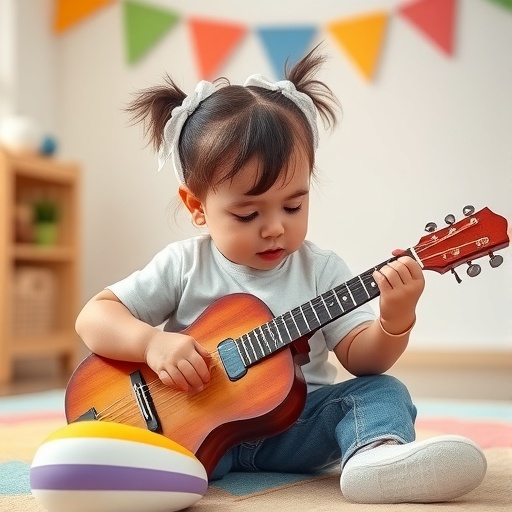In recent years, the educational landscape has been significantly transformed by the integration of arts into learning environments, particularly in early childhood education. A groundbreaking study conducted by researchers Qian, Yang, and Li has shed light on a specific aspect of this integration: the influence of musical play on children’s executive functions. With a focus on children aged 4 to 5 years, the findings of this study may have profound implications for how we understand and enhance cognitive abilities in early childhood development.
Executive functions are critical cognitive processes that encompass skills such as working memory, cognitive flexibility, and inhibitory control. These functions enable individuals to manage their thoughts, actions, and emotions effectively. The differentiation between hot and cold executive functions is vital, as hot executive functions are linked to emotional and motivational processes, while cold executive functions are related to logic and reasoning. The study aimed to explore how musical play could impact both types of executive functions in preschool-aged children, revealing intriguing insights into this interplay.
The methodology employed by the researchers involved a controlled experimental design where participants were divided into two groups: one engaged in musical play activities and the other involved in non-musical play. The musical play included activities that required rhythm, melody, and song, which have been shown to stimulate various areas of the brain. By measuring the development of executive function skills through standardized assessments before and after the intervention, the researchers were able to gather comprehensive data on the effects of musical play.
Results from the study indicated a significant enhancement in both hot and cold executive functions for children who participated in musical play. These findings highlight the power of music as a pedagogical tool that not only fosters creativity and expression but also strengthens essential cognitive abilities. The study posits that musical play engages children on multiple levels, promoting emotional intelligence while simultaneously enhancing logical reasoning skills.
One particularly compelling aspect of the study is its alignment with the neurological basis of music and cognitive function. Research indicates that engaging with music activates extensive areas of the brain, including those responsible for language, memory, and motor skills. This multi-faceted engagement may explain the observed improvements in executive functions, as children who play musically are developing complex neural pathways that support their cognitive growth.
Moreover, these results offer valuable insights for educators and parents alike. Understanding that musical play can provide substantial cognitive benefits empowers adults to incorporate music into daily activities with children. From singing songs to rhythm-based games, there are myriad ways to engage children through music that can lead to enhanced executive functioning. The implications of this are vast—if musical play can provide such profound effects, it invites further exploration into other artistic domains, such as dance and visual arts.
Additionally, the study provides a fresh perspective on the importance of play in early childhood education. Traditionally, academic achievement has been emphasized over play-based learning; however, this research indicates that play—especially musical play—should be recognized as a critical component of cognitive development. The distinction between academic learning and playful exploration may need to be reevaluated, promoting a more holistic approach to childhood education that acknowledges the vital role of creativity in learning.
In terms of practical applications, educators might consider integrating structured musical play into their curriculums or after-school programs. By fostering environments in which music is woven into the fabric of learning, schools can nurture well-rounded individuals equipped with essential cognitive skills needed for future academic success. Furthermore, this approach can support social development, as children who engage in group musical activities improve their collaborative skills and emotional intelligence through shared experiences.
While the findings are promising, it is important to recognize the limitations of the study, including the need for longitudinal research to track the long-term benefits of musical play. Future studies could delve deeper into how different types of music—classical, folk, or contemporary—may yield varying effects on executive functions. Additionally, exploring the role of cultural differences in musical experiences could provide a more nuanced understanding of how musical play impacts cognitive development across diverse populations.
The significance of Qian, Yang, and Li’s research cannot be overstated. As we continue to seek innovative ways to enhance early childhood education, the integration of musical elements provides a vibrant avenue for exploration. Encouraging musical play is not merely an enrichment activity; it is a profound invitation to foster cognitive development in young children in a manner that is both enjoyable and impactful. Ultimately, this research highlights a future where education is not confined to traditional methods but instead embraces the transformative power of the arts.
In conclusion, as we reflect on the interplay between music and cognitive development, it becomes increasingly evident that the holistic development of children hinges on fostering creativity through diverse play experiences. The promise of musical play stands as a beacon for educators, parents, and policymakers alike to reconsider the ways in which we approach early childhood education. By embracing the findings of this transformative study, we can open new pathways for children to thrive cognitively, emotionally, and socially, ensuring that they are not just educated but enriched in their formative years.
Subject of Research: The influence of musical play on executive functions in preschool-aged children.
Article Title: The Influence of Musical Play on Hot and Cold Executive Functions in Children Aged 4–5 Years.
Article References:
Qian, R., Yang, A., Li, L. et al. The Influence of Musical Play on Hot and Cold Executive Functions in Children Aged 4–5 Years.
Early Childhood Educ J (2025). https://doi.org/10.1007/s10643-025-01995-8
Image Credits: AI Generated
DOI: 10.1007/s10643-025-01995-8
Keywords: Musical play, executive functions, early childhood education, cognitive development.




